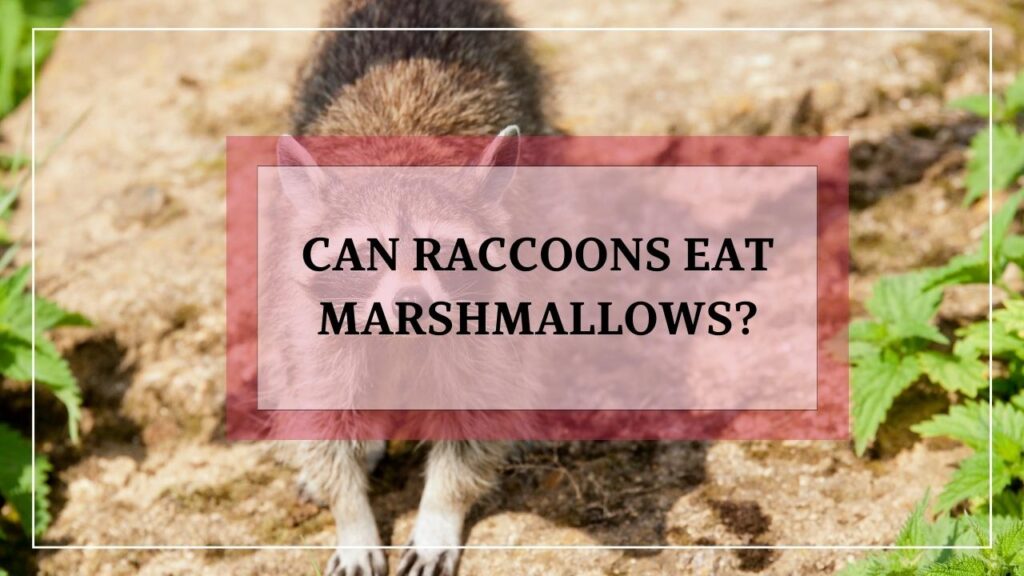Have you ever wondered if raccoons can eat marshmallows? Well, the answer is yes, raccoons can eat marshmallows! Raccoons are clever creatures that live in forests and sometimes even in cities. They have a reputation for being very good at finding food. While raccoons mostly eat things like fruits, nuts, and bugs, they are also known to eat other foods that they come across. Marshmallows are a sweet treat that many people enjoy, and raccoons are no exception! However, it’s important to note that while raccoons can eat marshmallows, it’s not the healthiest food for them. Just like humans, raccoons need a balanced diet to stay healthy and strong. So, while it’s okay for raccoons to have a marshmallow every now and then as a special treat, they should mostly stick to their natural diet.
Can Raccoons Eat Marshmallows?
Ingredients and Nutritional Composition of Marshmallows
So, let’s start by taking a closer look at marshmallows. These fluffy treats are typically made from sugar, corn syrup, gelatin, and a few other ingredients. Unfortunately, they don’t offer much in terms of nutritional value. They are high in sugar and low in essential nutrients like vitamins and minerals. In other words, they’re not exactly a health food option, even for humans!
Digestive System of Raccoons
Now, raccoons, on the other hand, have a pretty versatile digestive system. These critters are omnivores, which means they can eat both plant and animal matter. Their bodies are designed to handle a variety of foods, including fruits, vegetables, insects, small animals, and even garbage. Raccoons have a relatively short digestive tract, allowing them to digest food quickly.
Risks and Health Concerns
While raccoons have a flexible diet, it’s important to consider the potential risks and health concerns associated with feeding them marshmallows. Due to their high sugar content, marshmallows can contribute to obesity in raccoons, just like in humans. This can lead to various health issues, including diabetes and heart disease. Additionally, the sticky texture of marshmallows can also pose a risk to their dental health.
Alternatives to Marshmallows
Instead of marshmallows, it’s best to provide raccoons with natural and nutritious foods. Fruits and vegetables, such as apples, berries, and carrots, are great options. Raccoons also need protein in their diet, so you can offer them cooked eggs or small portions of cooked meat. Remember, variety is key! Offering a balanced and diverse diet will help keep raccoons healthy and happy.
Related Article:Can Raccoons Eat Cherries?
Tips for Attracting Raccoons to Your Yard
If you’re interested in observing raccoons in your yard, there are a few things you can do to create a raccoon-friendly environment. Make sure to secure your trash cans to prevent raccoons from rummaging through them. Removing potential food sources, like fallen fruits or unattended pet food, can also discourage raccoons from visiting. And don’t forget, it’s always best to observe wildlife from a safe distance and respect their natural habitat.
And there you have it! While raccoons may have a taste for adventure, marshmallows are not the best choice for their diet. Stick with natural and nutritious options, and you’ll be helping these clever critters thrive in their urban and wild habitats.
FAQs
1. Can raccoons eat marshmallows?
Yes, raccoons can eat marshmallows. However, it is not recommended to feed them marshmallows as a regular part of their diet. Marshmallows are high in sugar and offer little nutritional value. Feeding raccoons human food can also disrupt their natural diet and lead to health issues.
Related Article:Can Raccoons Eat Strawberries?
2. Are marshmallows harmful to raccoons?
While marshmallows are not toxic to raccoons, consuming large quantities of sugary foods like marshmallows can be harmful to their health. Raccoons have a diverse diet in the wild, consisting mainly of fruits, vegetables, nuts, and insects. Feeding them foods like marshmallows can cause obesity, dental issues, and digestive problems.
3. Can raccoons be attracted to marshmallows as bait?
Yes, marshmallows can be used as bait to attract raccoons, especially when trapping them for relocation or removal. The sweet scent and taste of marshmallows can entice raccoons to approach traps. However, it is important to follow local laws and regulations regarding trapping and removing raccoons to ensure their humane treatment.
Conclusion
In conclusion, raccoons are omnivorous animals that have a remarkable ability to adapt to different environments. While they have a preference for natural foods found in the wild, they are also known for their scavenging behavior and ability to thrive in urban areas.
Related Article:Can Raccoons Eat Raisins
When it comes to their nutritional needs, raccoons require a balanced diet that includes a variety of proteins, carbohydrates, and fats. Marshmallows, however, do not meet these nutritional requirements. They are high in sugar and lack essential nutrients necessary for raccoons’ overall health.
Feeding marshmallows to raccoons can have negative effects, such as obesity, dental issues, and an increased risk of diabetes. It is important to prioritize their well-being by offering natural and nutritious foods instead.
Some suitable alternatives to marshmallows include fruits, vegetables, eggs, and cooked meat. It is crucial to provide a varied diet that mimics their natural food sources to ensure optimal health.
Related Article:Can Raccoons Eat Bread?
To attract raccoons to your yard, create a raccoon-friendly environment by securing trash cans and removing potential food sources. Observing raccoons in their natural habitat can be a rewarding experience that allows us to appreciate and respect wildlife.
In conclusion, by understanding the diet and nutritional needs of raccoons, we can ensure their well-being while enjoying their presence in our surroundings. Let’s strive to provide them with the best possible diet and environment while keeping their best interests in mind.
Related Article:Can Raccoons Eat Bananas?

